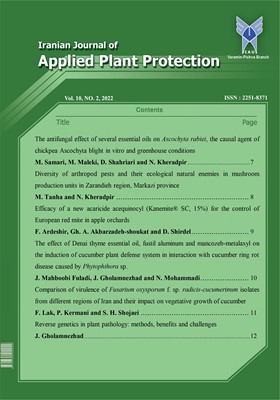The antifungal effect of several essential oils on Ascochyta rabiei, the causal agent of chickpea Ascochyta blight in vitro and greenhouse conditions
Subject Areas : Plant PestsMohammad Samari 1 , Mojdeh Maleki 2 * , dariush shahriari 3 , Neda Kheradpir 4
1 - Former MSc student , Department of Plant Pathology, Faculty of Agriculture, Varamin-Pishva Branch, Islamic Azad University, Varamin, Iran.
2 - Assistant Professor, Department of Plant Pathology, Faculty of Agriculture, Varamin-Pishva Branch, Islamic Azad University, Varamin, Iran.
3 - Head of Greenhouse Research Department of Tehran Agricultural and Natural Resources
Research and Education Center
4 - Assistant Professor, Department of Plant Protection, College of Agriculture, Varamin-Pishva Branch, Islamic Azad University, Varamin, Iran
Keywords: Chickpea, Ascochyta blight, plant essential oil, inhibitory,
Abstract :
One of the greatest biotic stress reducing potential yield in chickpea is Ascochyta blight caused by Ascochyta rabiei Pass. (Labr.) which is distributed worldwide. Due to its severity and to decreasing the environmental biological impact of chemical control, research on natural compounds like plant essential oils would be a helpful step in the disease management. In this study, the antifungal efficacy of essential oil of eight plants including thyme, savory, pennyroyal, mint, tarragon, fennel, cumin and ajwain at 5 concentrations in 3 replications under complete random design was evaluated. Characteristics like mycelial growth inhibition (MGI), inhibitory minimum concentration (IMC) and speed of colony growth after treatment were studied under laboratory condition. Pathogenicity index was studied under greenhouse condition by the selected plants through laboratory tests in comparison with the fungicide Rovral-TS and intact and infected controls. Result showed that at greenhouse, thyme and fennel showed the most inhibitory index in comparison with the rest six plants. Fennel showed the most effective MGI against Ascochyta blight at laboratory. The result of the present study show that thyme and fennel would be great options to be considered in the integrated management programs of chickpea Ascochyta blight.
_||_

